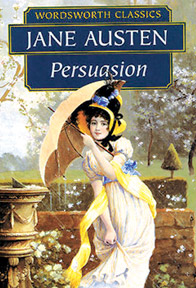|
Jane austen’s persuasion:
‘She learned romance as she grew older’
 ‘Persuasion’, the last and least known of Jane Austen's novels, has
always been my favourite. It is both the most romantic and the most
progressive of Les Six. ‘Persuasion’, the last and least known of Jane Austen's novels, has
always been my favourite. It is both the most romantic and the most
progressive of Les Six.
The novel hardly seems a likely prospect for a great romance. Its
heroine, unlike her five predecessors, is far beyond the bloom of youth
and is therefore seen to be poor in marital prospects. And, unlike the
typical romance, the story is far from action-packed. The dramatic
action takes place mainly in the consciousness of the heroine with
little or no direct involvement of the one who is its primary object.
Anne Eliot had broken off her unofficial engagement to Captain
Wentworth eight years earlier. She had yielded to persuasion by her late
mother's, and now her own, closest friend, Lady Russel, who regarded him
as lacking in social graces and material prospects. She has regretted
her decision ever since. “She had been forced into prudence in her
youth, she learned romance as she grew older: the natural sequel of an
unnatural beginning.”

 |
|
A scene
from the movie based on the novel |
Although Wentworth unexpectedly returns to the scene, he is now
indifferent to her. Yet the feelings dormant in her for so many years
are stirred, and thus is set in motion the romantic energy of the novel.
Though beyond hope, she dares to hope that she may not be beneath his
notice. “Once she felt that he was looking at herself, observing her
altered features, trying to trace in them the ruins of the face which
had once charmed him;” Then, as sundry chance meetings and interactions
on behalf of others take place, her hope begins to develop through an
ever- increasing yearning for the renewal of his affections to her
eventually becoming convinced that he still cares for her.
“...all, all declared that he had a heart returning to her at least;
that anger, resentment, avoidance, were no more; and that they were
succeeded, not merely by friendship and regard, but by the tenderness of
the past. Yes, some share of the tenderness of the past! She could not
contemplate the change as implying less. He must love her.”
As evident from the quotations so far, our interest and involvement
in the hopes and fears of the heroine are maintained mainly through her
private reflections fuelled by the exchange of a few mostly noncommittal
words and looks, until the penultimate chapter when the Captain finally
declares his love. This bears witness to Jane Austen's skill in keeping
the romantic excitement going throughout, and leads us to consider the
first of two ways in which this novel is her most progressive, namely
its style.
The action of the novel, the twists and turns of its plot, are not
the main interest nor the main source of its romantic quality. These are
only occasions for exploring the mind of the heroine. Jane Austen could
well say with Wordsworth, “The mind of (wo)man the main region and haunt
of my song.” Her real concern is with the thoughts and feelings of the
heroine, which record the re-growth of love and the growth of hope for
love in return in a woman's heart. Here Jane Austen proves to be a
pioneer in featuring the interior life of her heroine and having the
real drama of her story enacted in her consciousness.
“For the first time since their renewed acquaintance, she felt that
she was betraying the least sensibility of the two. She had the
advantage of him in the preparation of the last few moments. All the
overpowering, blinding, bewildering, first effects of strong surprise
were over with her. Still, however, she had enough to feel! It was
agitation, pain, pleasure; a something between delight and misery.”
Anne Elliot is really the precursor of that future heroine of the
English novel whom Henry James describes as a “vessel of consciousness”,
in that her developing consciousness determines the moral implications
of the novel. Thus Isabel Archer in James’ ‘Portrait of a Lady ‘and
Ursula in DH Lawrence's ‘The Rainbow'. It is not surprising that FR
Leavis considers Jane Austen to be the first representative of the great
tradition of English novelists in which he includes James and Lawrence.
The other aspect in which ‘Persuasion’ is Jane Austen's most progressive
novel is its thematic material. Of the two closely connected main
themes, the first - every bit as relevant now as then - is the plight of
one in Anne Elliot's situation, the single woman far beyond the bloom of
youth, not possessing a gift for singleness and without marital
prospects. Anne “was nobody with either father or sister; her word had
no weight, her convenience was always to give way: she was only Anne.”
Even the younger married sister who loves her is insensitive to her
feelings and makes a convenience of her.
The sense of forlornness that such a woman may experience even in the
midst of agreeable company is poignantly captured: “She knew that when
she played (the piano) she was giving pleasure only to herself; but this
was no new sensation.
Excepting one short period of her life, she had never, since the age
of fourteen, never since the loss of her dear mother, known the
happiness of being listened to, or encouraged by any just appreciation
or real taste. In music she had always been used to feel alone in the
world;” And there is the related theme of the unfulfilled potential for
love in such a woman as Anne. The tragedy in her case is the terrible
lack of opportunity to bestow and enjoy romantic love.
Her being schooled by experience to endure deprivation and
humiliation and to put herself out in the service of others, only serves
to deepen her potential for romance and to enhance her eligibility for
it. This, in fact, is what Wentworth recognises and what makes the
initial dent in the armour of his pride and resentment.
One of the most significant passages in the book is that where Anne
asserts the tenderer and profounder nature of a woman's love in
comparison to a man's, in conversation with Wentworth's friend, Captain
Harville:
‘ÓYour feelings may be the strongest,” replied Anne, “but the same
spirit of analogy will allow me to assert that ours are the most tender.
Man is more robust than woman, but he is not longer lived; which
explains exactly my view of the nature of their attachments. Nay, it
would be too hard upon you, if it were otherwise. You have difficulties,
and privations, and dangers enough to struggle with.
You are always labouring and toiling, exposed to every risk and
hardship. Your home, country, friends, all quitted. Neither time, nor
health, nor life, to be called your own. It would be too hard, indeed”
(with a faltering voice), “if a woman's feelings were to be added to all
this.Ó’
Anne's generalisation about women is actually a true statement of the
superior quality of her own capacity for love and, by extension, that of
women in her particular situation.
It is his overhearing her words that finally breaks Wentworth's
heart, makes him realise the full extent of her lovableness and respond
to her as he should. But whereas in Anne's particular case we have the
satisfaction of a happy ending, there remains the grim implication for
the majority who share her plight - the tragedy of such a capacity for
love remaining unfulfilled. In this sense, Anne is actually a tragic
heroine-figure by implication. As such, she is quite different from Jane
Austen's other heroines, none of whom is doomed, whilst having a heart
full of love, to the prospect of lifelong singleness.
The novel is also radical in in its secondary theme, namely that of
social change which is absent in the earlier novels.
It is here that Jane Austen's irony is primarily at work, sometimes
turning almost savage as she exposes the false values and pretensions of
the titled class represented by Anne's father and her elder sister and
the rest of their circle. But, although ‘Pride and Prejudice was Jane
Austen's favourite among her novels, it is probably ‘Persuasion’ that
most closely reflects her personal experience.
|



